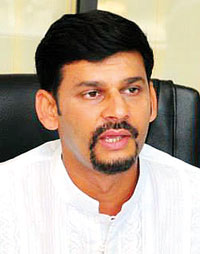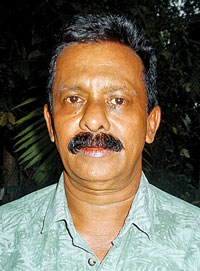News
Candidates face up to economic realities
View(s):By Nadia Fazlulhaq
Limits on election spending, coupled with high costs of printing and fuel, are among the challenges that candidates at the March local elections will face.
As candidates canvass voters, some of them are even coming across desperate voters who want the candidates to pay their bills.
Teacher Ajith Nanayakkara, 42, who is contesting for the Bulathkohupitiya Pradeshiya Sabha, is content with polls expenditure being controlled by law, but not sure if the public will get what they expect due to the economic crisis.

Lakshman Perera
“One candidate here has about one or two polling divisions. I am making telephone calls to voters. We are trying to keep the costs low, while putting extra effort to reach out to voters,” he said.
The former president of the Bulathkohupitiya Cooperative Society, Mr Nanayakkara, is worried that the public is expecting many development projects to start or continue after they had been halted due to the coronavirus disease pandemic.
Sudantha Marage, a candidate for Ratgama Pradeshiya Sabha said he will have to spend more on cutouts, posters, and leaflets as a first timer.
“I am a retired army officer entering politics for the first time. I have to put more effort in introducing myself and my objectives. If not, Rs.15-Rs 20 per voter is more than sufficient for a politician who has done significant community and development work in his area. At present, many candidates are visiting the houses of voters and conducting pocket meetings,” he said.
However, it is more challenging for candidates who have to woo voters from the city and suburbs.
Chairman of the Kesbewa Urban Council Lakshman Perera who will be contesting said the Rs.15 allocated per voter is insufficient for candidates in cities.
“Some supporters visit our houses expecting food and even a cup of tea. Even house visits are joined by supporters who expect some treats. It has also been hard visiting houses as people are pleading with us to pay their utility bills, asking us to provide dry rations, and school supplies,” he said.
Another candidate from Panadura said this election will all come down to how much work a politician has done previously in their area.
Mujibur Rahuman, former parliamentarian said that with the cost of printing and paper going up, candidates are struggling to get posters, leaflets printed at affordable prices.

Sudantha Marage
“There are about 47 wards in Colombo city with each ward consisting of about 10,000 to 15,000 voters. Rs.20 per voter expenditure should be increased to at least Rs.100 especially in densely populated cities,” he said.
Some candidates appear to be confused about the recently passed Regulation of Election Expenditure Act.
“We are in the process of preparing a booklet containing a simplified version of provisions of the Act. This will be distributed within this week to all parties and independent groups. This needs to reach all 80,720 candidates via their parties,” said executive director of the People’s Action for Free and Fair Elections (PAFFREL), Rohana Hettiarachchi.
He said some candidates are unaware that they need to submit a detailed financial expenditure report after the elections.
Candidate expenses can be done in three ways. Candidates can allocate Rs.20 per voter in the area he or she contests. A party funding a candidate can support with only 60% of the above amount. A candidate on a list can be supported with 40%. Every donation needs to be transparent and based on current expenses. Accepting anonymous donations and the use of state property is strictly prohibited, Mr. Hettiarachchi said.
“This Act discourages voter buying and controls large amounts spent by candidates and parties,” he said.
Voters are being asked to be vigilant on extravagant spending, bribery and voter buying as legal action can be taken against a candidate under the Act. An elected member can be disqualified.
The Centre for Monitoring Election Violence (CMEV)’s final Report on the campaign cost monitoring initiative at the 2020 parliamentary election showed that Rs 3.6 billion had been spent in total by parties.
Out of which, Rs.170 million had been spent for printing, Rs. 235m for an electronic media campaign, Rs. 60m for social media and Rs.76m for ground campaigning and other costs. Most of the campaign expenditure was from one party.
(Additional reporting and pix by Gamini Mahadura and Ravindra Welagedara)
The best way to say that you found the home of your dreams is by finding it on Hitad.lk. We have listings for apartments for sale or rent in Sri Lanka, no matter what locale you're looking for! Whether you live in Colombo, Galle, Kandy, Matara, Jaffna and more - we've got them all!

